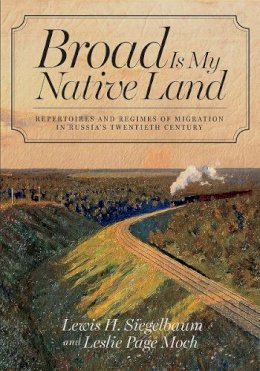
Broad Is My Native Land: Repertoires and Regimes of Migration in Russia´s Twentieth Century
Lewis H. Siegelbaum
Whether voluntary or coerced, hopeful or desperate, people moved in unprecedented numbers across Russia's vast territory during the twentieth century. Broad Is My Native Land is the first history of late imperial, Soviet, and post-Soviet Russia through the lens of migration. Lewis H. Siegelbaum and Leslie Page Moch tell the stories of Russians on the move, capturing the rich variety of their experiences by distinguishing among categories of migrants—settlers, seasonal workers, migrants to the city, career and military migrants, evacuees and refugees, deportees, and itinerants. So vast and diverse was Russian political space that in their journeys, migrants often crossed multiple cultural, linguistic, and administrative borders. By comparing the institutions and experiences of migration across the century and placing Russia in an international context, Siegelbaum and Moch have made a magisterial contribution to both the history of Russia and the study of global migration.The authors draw on three kinds of sources: letters to authorities (typically appeals for assistance); the myriad forms employed in communication about the provision of transportation, food, accommodation, and employment for migrants; and interviews with and memoirs by people who moved or were moved, often under the most harrowing of circumstances. Taken together, these sources reveal the complex relationship between the regimes of state control that sought to regulate internal movement and the tactical repertoires employed by the migrants themselves in their often successful attempts to manipulate, resist, and survive these official directives.
Product Details
About Lewis H. Siegelbaum
Reviews for Broad Is My Native Land: Repertoires and Regimes of Migration in Russia´s Twentieth Century
Gijs Kessler
Laboratorium: Russian Review of Social Research
Siegelbaum and Moch argue that, in reality, throughout three distinct periods in Russian history—the late imperial era, the Soviet years, and today—the phenomenon has been far more complex. The authors address what all this movement meant to these different groups and to society at large, offering insights into a little-understood aspect of Russian history.
Robert Legvold
Foreign Affairs
The work is chronologically ambitious—spanning the entire twentiethcentury and covering three different political systems—and thematically comprehensive.... Most importantly, by bringing a plethora of life stories into what could easily have been a dry, state-centric narrative, [the authors] provide a deeply human history of migration—the lives that it made, the lives that it changed, and the lives that it destroyed.
Ian W. Campbell
The Journal of Interdisciplinary History
This major work shows both the diversity and significance of migrations in twentieth-century Russia. A thought-provoking read, the book is recommended to all students and scholars of modern Russian history.
Denis Kozlov
Slavic Review
A learned and highly readable work of spatial history, Broad Is My Native Land rescues the voices of accidental stories and life trajectories in this general vein, sharing the everyday tales of internal Russian/Soviet mobility beneath these sedentarist regimes and their useful, if mundane, aggregations of data that make settlement in Russia appear more legible, progressive, and common than it really was.
Steven Seegel
American Historical Review
